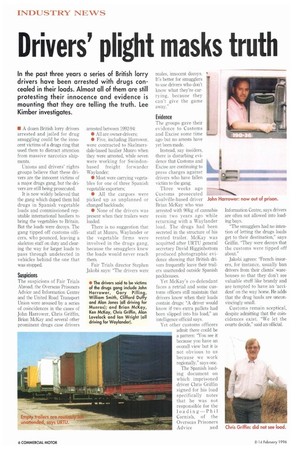Drivers' plight masks truth
Page 8

If you've noticed an error in this article please click here to report it so we can fix it.
In the past three years a series of British lorry drivers have been arrested with drugs concealed in their loads. Almost all of them are still protesting their innocence and evidence is mounting that they are telling the truth. Lee Kim ber investigates.
• A dozen British lorry drivers arrested and jailed for drug smuggling could be the innocent victims of a drugs ring that used them to distract attention from massive narcotics shipments.
Unions and drivers' rights groups believe that these drivers are the innocent victims of a major drugs gang, but the drivers are still being prosecuted.
It is now widely believed that the gang which duped them hid drugs in Spanish vegetable loads and commissioned reputable international hauliers to bring the vegetables to Britain. But the loads were decoys. The gang tipped off customs officers, who pounced, leaving a skeleton staff on duty and clearing the way for larger loads to pass through undetected in vehicles behind the one that was stopped.
Suspicions
The suspicions of Fair Trials Abroad, the Overseas Prisoners Advice and Information Centre and the United Road Transport Union were aroused by a series of coincidences in the cases of John Harrower, Chris Griffin, Brian McKay and several other prominent drugs case drivers arrested between 1992-94: • All are owner-drivers; • Five, including Harrower, were contracted to Skelmersdale-based haulier Munro when they were arrested, while seven were working for Swindonbased freight forwarder Waylander: • Most were carrying vegetables for one of three Spanish vegetable exporters; • All the cargoes were picked up as unplanned or changed backloads: • None of the drivers was present when their trailers were loaded.
There is no suggestion that staff at Munro, Waylander or the vegetable firms were involved in the drugs gang, because the smugglers knew the loads would never reach them.
Fair Trials director Stephen Jakobi says: "The drivers were mules, innocent decoys. * It's better for smugglers to use drivers who don't know what they're carrying, because they can't give the game away."
Evidence
The groups gave their evidence to Customs and Excise some time ago but no arrests have yet been made.
Instead, say insiders, there is disturbing evidence that Customs and Excise are continuing to press charges against drivers who have fallen victim to the gang.
Three weeks ago Customs prosecuted arrested with 90kg of cannabis resin two years ago while returning with a Waylander load. The drugs had been secreted in the structure of his rented trailer. McKay was acquitted after URTU general secretary David Higginbottom produced photographic evidence showing that British drivers frequently leave their trailers unattended outside Spanish packhouses.
Yet McKay's co-defendant faces a retrial and some customs officers still maintain that drivers know when their loads contain drugs: "A driver would know if two extra pallets had been slipped into his load," an intelligence official says.
Yet other customs officers admit there could be a pattern: "You see it because you have an overall view but it is not obvious to us because we work regionally," says one.
The Spanish loading document on which imprisoned driver Chris Griffin signed for his load specifically notes that he was not responsible for the Cornish, of the Overseas Prisoners Advice and Information Centre, says drivers are often not allowed into loading bays.
"The smugglers had no intention of letting the drugs loads get to their destination," says Griffin. "They were decoys that the customs were tipped off about."
Jakobi agrees: "French insurers, for instance, usually ban drivers from their clients' warehouses so that they don't see valuable stuff like brandy and are tempted to have an 'accident' on the way home. He adds that the drug hauls are unconvincingly small.
Customs remain sceptical, despite admitting that the coincidences exist. "We let the courts decide," said an official.




































































































